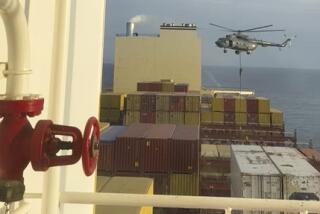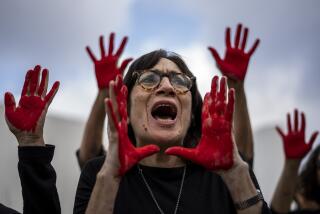Iranian Troops Appear to Be Digging In as 2-Week Drive Toward Basra Stalls
- Share via
KUWAIT — After nearly two weeks of fierce fighting and thousands of casualties on both sides, an Iranian advance into southern Iraq has apparently stalled, Western diplomats said Wednesday.
The diplomats, who have access to intelligence reports from the area, said the Iranians have failed to advance for several days and appear to be digging in.
According to the sources, the Iranians have captured a “small salient” of Iraqi territory running about 10 miles inward from the international boundary. Revising earlier reports that placed the invaders about six miles from Basra, Iraq’s second-largest city, the sources said the Iranians are a little more than 10 miles from the key southern city but have still failed to cross the strategic Shatt al Arab waterway.
‘No Advances for Days’
After heavy fighting around a man-made water barrier known as Fish Lake, the Iranians have managed to push slowly around the southern edge of the lake, the diplomats said.
“The battle has slowed down into fixed positions,” said one diplomat. “There have been no advances for days.”
The Iranians asserted Wednesday that their forces had captured a town called Duayji, which is nearly 10 miles from Basra, and they said 1,500 Iraqis were killed in the fighting.
For their part, the Iraqis have given few details of the ground situation southeast of Basra in recent days, maintaining only that all the Iranian attacks have been repulsed.
Despite the apparent halt to the Iranian offensive, the current phase of which began Jan. 9, the Iranians have won an enormous psychological victory over the Iraqis by seizing the territory and holding on to it for nearly two weeks.
The new positions enable Iranian troops to shell Basra even more heavily, which has already caused significant numbers of refugees to flee the city of 1 million.
One diplomat said the Iranians are now close enough to Basra to bombard the city with multiple-rocket launchers known as “Stalin Organs.” These set up a deafening roar and are known for causing panic in the target area.
Luxury Hotel Closed
One traveler from Basra said Wednesday that the city has been heavily damaged in two weeks of Iranian shelling. The luxury Sheraton Hotel was closed and most of its staff evacuated after the hotel took direct hits in its staff quarters and a conference room, the traveler said.
The Iranians are believed to want to capture Basra and establish a rump Islamic government for southern Iraq, where the population is mostly Shia Muslim, as it is in Iran. Iraqi President Saddam Hussein is of the Sunni Muslim sect.
While this goal has been stymied by the Iraqis for the time being, according to the diplomats, the invaders are now in a position to make life almost unbearable for the civilian population in Basra, effectively cutting off Iraq’s second city from the government in Baghdad.
“The Iranians lost the use of Khorramshar at the beginning of the war,” said one diplomat, “and now they seem able to keep the Iraqis out of Basra in substantial numbers.”
One diplomat said that because of the threat to Basra, the Iraqis are likely to attempt a major counteroffensive soon.
After losing tens of thousands killed, both sides are reinforcing their troops at the front lines. The Pentagon estimates that Iran has lost 20,000 troops, and Iraq almost 10,000, since Christmas.
The situation appears similar to the one around Al Faw, a one-time oil port that the Iranians captured last February in a surprise assault across the Shatt al Arab.
The Iranians were unable to expand their beachhead on the Faw Peninsula, but the Iraqis were also unable to dislodge the invaders. This constituted an immense blow to the prestige of Hussein’s government, since it was the first time in the six-year-old war that Iran had managed to capture Iraqi territory and hold it.
Second Front Stopped
The Iraqi position is much the same near Basra, according to Western diplomats. However, the Iraqis appear to have registered more of a success to the north, where they apparently stopped Iran from opening a second front in the central sector only about 70 miles from Baghdad.
The muddy terrain near Basra makes it difficult for the Iraqis to effectively deploy their advantage in firepower, particularly tanks, which cannot maneuver in the swamps near the Shatt al Arab.
It also has become a principle of Iraqi policy to avoid casualties at all costs, which many Western analysts believe accounts for the failure of the powerful Iraqi air force to have much impact against the Iranians. Committing their planes against the troops besieging Basra would inevitably result in a number of pilot casualties and aircraft losses, the analysts said.
The Iraqis have a population of about 13 million, while Iran has more than 40 million people and can more easily absorb war losses.
More to Read
Sign up for Essential California
The most important California stories and recommendations in your inbox every morning.
You may occasionally receive promotional content from the Los Angeles Times.










